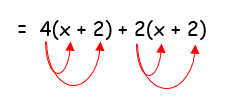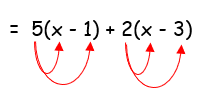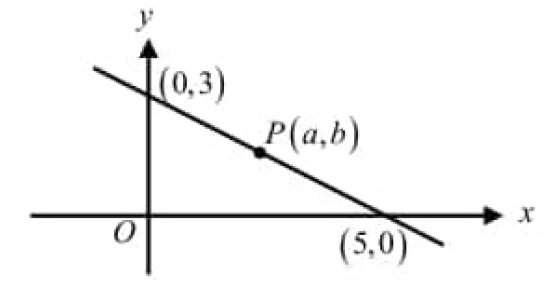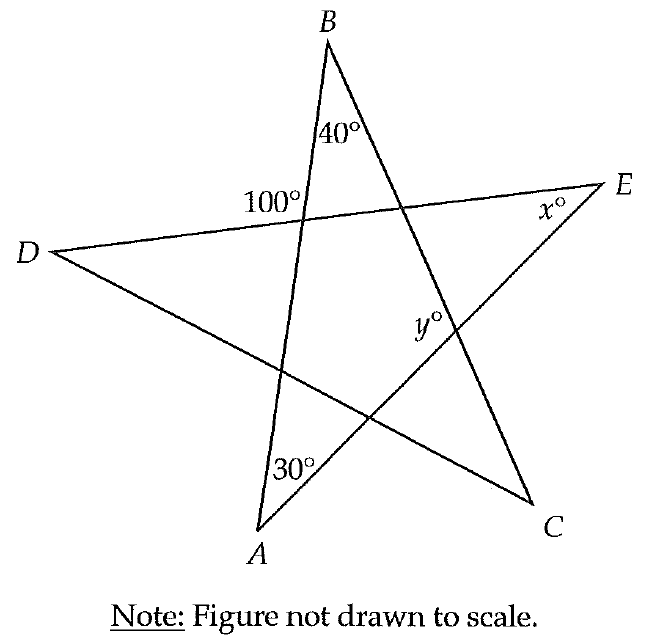SIMPLIFYING EXPRESSIONS USING DISTRIBUTIVE PROPERTY
Let us consider the following expression.
a(b+c)
Here a is common for all the terms what we are having inside the parenthesis. After applying distribution, we get
= a(b) + a(c)
= ab + ac
So, the answer is ab+ac.
Expand and Simplify :
Example 1 :
4(x + 1) + 2(x + 2)
Solution :
Given, 4(x + 1) + 2(x + 2)
By using distributive property,
We get,

= 4x + 4 + 2x + 4
= 6x + 8
= 2(x + 4)
So, the answer is 2(x + 4)
Example 2 :
4(x + 2) + 2(x + 2)
Solution :
Given, 4(x + 2) + 2(x + 2)
By using distributive property,
We get,

= 4x +
8 + 2x + 4
= 6x + 12
= 6(x + 2)
So, the answer is 6(x + 2)
Example 3 :
5(x - 1) + 2(x - 3)
Solution :
Given, 5(x - 1) + 2(x - 3)
By using distributive property,
we get,

= 5x - 5 + 2x - 6
= 7x - 11
= 7x - 11
So, the answer is 7x - 11
Example 4 :
2(2x - 3) + 3(2 - x)
Solution :
Given, 2(2x - 3) + 3(2 - x)
By using distributive property,
we get,

= 4x - 6 + 6 – 3x
= x
So, the answer is x
Example 5 :
3(m + 2) - 2(m - 6)
Solution :
Given, 3(m + 2) - 2(m - 6)
By using distributive property,
we get,

= 3m + 6 – 2m + 12
= m + 18
So, the answer is m + 18
Example 6 :
2(m - 1) - 5(m + 2)
Solution :
= 2(m - 1) - 5(m + 2)
= 2m - 2 – 5m - 10
= - 3m – 12
= - 3(m + 4)
So, the answer is - 3(m + 4)
Example 7 :
2(x + 1) - 2(2x + 3)
Solution :
= 2(x + 1) - 2(2x + 3)
= 2x + 2 – 4x - 6
= - 2x – 4
= - 2(x + 2)
So, the answer is - 2(x + 2)
Example 8 :
8(2 + x) - (5x + 3)
Solution :
= 8(2 + x) - (5x + 3)
= 16 + 8x – 5x - 3
= 3x + 13
= 3x + 13
So, the answer is 3x + 13
Example 9 :
9(x - 2) + 3(7 – 4x)
Solution :
= 9(x - 2) + 3(7 – 4x)
= 9x - 18 + 21 – 12x
= - 3x + 3
= - 3(x – 1)
So, the answer is - 3(x – 1)
Example 10 :
9(2 – 5x) - 2(3x + 2)
Solution :
= 9(2 – 5x) - 2(3x + 2)
= 18 – 45x – 6x – 4
= -51x + 14
= -51x + 14
So, the answer is -51x + 14.
Example 11 :
- 4(2n – 3) - 3(3n - 5)
Solution :
= - 4(2n – 3) - 3(3n - 5)
= - 8n + 12 – 9n + 15
= - 17n + 27
= - 17n + 27
So, the answer is – 17n + 27
Example 12 :
7(x – 1) + 2(2x + 3) – 11x
Solution :
Given, 7(x – 1) + 2(2x + 3) – 11x
By using distributive property,
we get,
= 7(x – 1) + 2(2x + 3) – 11x
= 7x – 7 + 4x + 6 – 11x
= 11x – 1 – 11x
= - 1
So, the answer is – 1.
Example 13 :
A plumber charges $70 for the first thirty minutes of each house call plus $4 for each additional minute that she works. The plumber Kemin $122 for her time. What amount of time, in minute did the plumber work ?
a) 43 b) 48 c) 58 d) 64
Solution :
Let x be the number of minutes she works.
$70 for the first minute and $4 for each additional minute.
70 + 4(x - 30)
Plumber Kemin charges = $122x
70 + 4(x - 30) = 122
70 + 4x - 120 = 122
-50 + 4x = 122
4x = 122 + 50
4x = 172
x = 172/4
x = 43
So, the required number of minutes is 43.
Example 14 :
Gerg pays a fee of $20 a month for local calls. Long distance rates 6 cent per minute for in state calls and 5 cent per minute for out of state calls. Suppose Gerg makes 300 minutes of long distance phone calls in January and m of those minute are for in state calls.
i) Find an expression for Gerg's phone bill for January
ii) Evaluate the expression to find the cost it Gerg had 37 minutes of in state calls in January.
Solution :
i) The bill is the sum of monthly fee, in state charges and the out of state charges.
If m = number of minutes of in state calls
300 - m = number of minutes out of state calls
Let B be phone bill for the month of January.
B = 20 + m(0.06) + (300 - m) 0.05
= 20 + 0.06m + 15 - 0.05m
= 35 + 0.01m
So, the required expression is 35 + 0.01m
ii) Evaluate the expression when m = 37
= 35 + 0.01(37)
= 35 + 0. 37
= $35.37
Kindly mail your feedback to v4formath@gmail.com
We always appreciate your feedback.
©All rights reserved. onlinemath4all.com
Recent Articles
-
Digital SAT Math Problems and Solutions (Part - 134)
Apr 02, 25 12:40 AM
Digital SAT Math Problems and Solutions (Part - 134) -
SAT Math Resources (Videos, Concepts, Worksheets and More)
Apr 02, 25 12:35 AM
SAT Math Resources (Videos, Concepts, Worksheets and More) -
Digital SAT Math Problems and Solutions (Part 135)
Apr 02, 25 12:32 AM
Digital SAT Math Problems and Solutions (Part 135)

